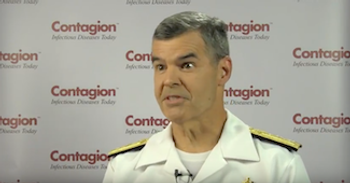
Richard Krieger, MD, chairman of the Infection Control Committee at Chilton Medical Center, and infectious disease physician at ID care, discusses how symptoms associated with Lyme arthritis differ from those of rheumatoid arthritis.

Richard Krieger, MD, chairman of the Infection Control Committee at Chilton Medical Center, and infectious disease physician at ID care, discusses how symptoms associated with Lyme arthritis differ from those of rheumatoid arthritis.

Stephen Redd, MD (RADM, USPHS), Director of the Office of Public Health Preparedness and Response (OPHPR) at the Centers for Disease Control and Prevention (CDC), explains what is currently known about Zika and Dengue coinfection.

Richard Krieger, MD, chairman of the Infection Control Committee at Chilton Medical Center, and infectious disease physician at ID care, explains how clinicians should manage patients with so-called “chronic Lyme disease.”

Stephen Redd, MD (RADM, USPHS), Director of the Office of Public Health Preparedness and Response (OPHPR) at the Centers for Disease Control and Prevention (CDC), discusses whether or not there are differences between US-acquired Zika and non-US acquired Zika virus cases.

Richard Krieger, MD, chairman of the Infection Control Committee at Chilton Medical Center, and infectious disease physician at ID care, discusses tests used to diagnose Lyme disease and the potential consequences of misdiagnosis.

Stephen Redd, MD (RADM, USPHS), Director of the Office of Public Health Preparedness and Response (OPHPR) at the Centers for Disease Control and Prevention (CDC), gives a brief overview of Zika Virus.

Richard Krieger, MD, chairman of the Infection Control Committee at Chilton Medical Center, and infectious disease physician at ID care, provides a brief overview of Lyme disease.

Stephen Redd, MD (RADM, USPHS), Director of the Office of Public Health Preparedness and Response (OPHPR) at the Centers for Disease Control and Prevention (CDC), explains how the Zika virus spread to the United States.

Richard Krieger, MD, chairman of the Infection Control Committee at Chilton Medical Center, and infectious disease physician at ID care, discusses how clinicians go about diagnosing Lyme disease.

Kenneth Fife, MD, PhD, Professor of Medicine at Indiana University, School of Medicine, discusses whether or not his genital herpes vaccine, GEN-003, can protect against oral herpes.

Barry Kreiswirth, PhD, founding director, Public Health Research Institute Tuberculosis Center, professor of medicine at Rutgers University, explains the differences between a research lab and a hospital lab.

Pedro Fernando da Costa Vasconcelos, MD, PhD, director of WHO Collaborating Center for Arbovirus and Research, Evandro Chagas Institute, discusses the prognosis of babies with Zika-related complications.

Stephen Redd, MD (RADM, USPHS), Director of the Office of Public Health Preparedness and Response (OPHPR) at the Centers for Disease Control and Prevention (CDC), discusses how clinicians can prepare for public health threats.

Stephen Redd, MD (RADM, USPHS), Director of the Office of Public Health Preparedness and Response (OPHPR) at the Centers for Disease Control and Prevention (CDC), explains why healthcare providers are the ideal candidates to relay information about public health preparedness.

Barry Kreiswirth, PhD, founding director, Public Health Research Institute Tuberculosis Center, professor of medicine at Rutgers University, discusses the challenges of conducting clinical trials as the threat of antibiotic resistance increases.

Pedro Fernando da Costa Vasconcelos, MD, PhD, director of WHO Collaborating Center for Arbovirus and Research, Evandro Chagas Institute, discusses whether or not all Zika-infected pregnant women will infect their fetuses.

Kenneth Fife, MD, PhD, Professor of Medicine at Indiana University, School of Medicine, discusses manipulating the immune system to fight genital herpes.

Pedro Fernando da Costa Vasconcelos, MD, PhD, director of WHO Collaborating Center for Arbovirus and Research, Evandro Chagas Institute, discusses the likelihood that fetuses congenitally infected with the Zika virus will develop related complications, such as microcephaly.

John D'Angelo, MD, senior vice president, executive director Emergency Medicine Services at Northwell Health, discusses how hospitals use updates from the Department of Health to remain aware of any potential outbreaks.

Pedro Fernando da Costa Vasconcelos, MD, PhD, director of WHO Collaborating Center for Arbovirus and Research, Evandro Chagas Institute, discusses the possibility of the Zika virus evolving to cause other complications in the future.

Barry Kreiswirth, PhD, founding director, Public Health Research Institute Tuberculosis Center, professor of medicine at Rutgers University, discusses the “ideal” treatment method for antibiotic-resistant bacteria.

Pedro Fernando da Costa Vasconcelos, MD, PhD, director of WHO Collaborating Center for Arbovirus and Research, Evandro Chagas Institute, explains how Zika has evolved since the 1960s.

John D'Angelo, MD, senior vice president, executive director Emergency Medicine Services at Northwell Health, discusses the prevalence of tuberculosis in the United States.

Barry Kreiswirth, PhD, founding director, Public Health Research Institute Tuberculosis Center, professor of medicine at Rutgers University, discusses the alarming rate of which antibiotic-resistant strains and genes are spreading worldwide and our need for new, effective antibiotics to counteract it.

Andrew Chasteen from Accelerate Diagnostics, Inc, discusses who will benefit most from Morphokinetic Cellular Analysis, keeping in mind the challenges posed by antibiotic resistance.

Barry Kreiswirth, PhD, founding director, Public Health Research Institute Tuberculosis Center, professor of medicine at Rutgers University, explains how active surveillance can assist in the fight against antibiotic resistance.

Andrew Chasteen from Accelerate Diagnostics, Inc, explains future applications of Morphokinetic Cellular Analysis (MCA).

Barry Kreiswirth, PhD, founding director, Public Health Research Institute Tuberculosis Center, professor of medicine at Rutgers University, explains the threat of a “true” superbug.

Kirk Hevener, PharmD, PhD, assistant professor of Biomedical and Pharmaceutical Sciences at Idaho State University, College of Pharmacy, explains his research regarding topoisomerase I and II enzymes.

Barry Kreiswirth, PhD, founding director, Public Health Research Institute Tuberculosis Center, professor of medicine at Rutgers University, discusses the implications of the findings of his study.